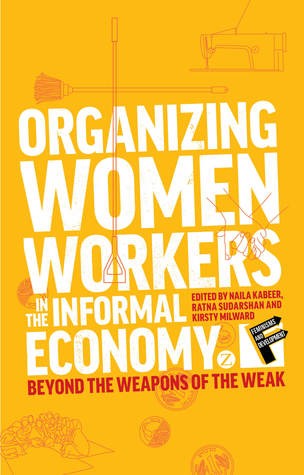Organizing Women Workers in the Informal Economy
Naila Kabeer, Ratna Sudarshan and Kirsty Milward edited "Organizing Women Workers in the Informal Economy: Beyond the Weapons of the Weak" (2013), which presents a series of cases from around the world. The book "shifts the analytical focus from individual women engaged in these informal forms of work to organizations that have set out to work with women in the informal economy. (p. 2). For each of the cases, the authors explore the rationales of organizing and the strategies utilized as well as offering reflections on what the cases offer in terms of insight into pathways of change. The editors argue that there is "a growing body of experience of organizing hard-to-reach working women in the informal economy, but few attempts to synthesize these experiences and draw out their lessons. That task is undertaken by this book" (p. 5-6).
Of the high-level findings, the cases "suggest that, in place of the more confrontational tactics traditionally associated with the trade union movement, these organizations often sought to achieve their goals through the exercise of 'soft power', drawing on the resources offered by culture, discourse, information and communications, and the law." (p. 16) Of the lessons, one is that "strategies evolve and change over time. The 'long feedback loop' entailed in efforts to address the structural aspects of women's positions in their communities - and society more generally - means that highly politicized demands are unlikely to bring women together in the first instance. As women come together around the more practical concerns of their daily lives, however, as their collective identity starts to grow and strengthen, they appear to become more willing to take on these more political issues. Thus it may be that initial strategies are gentler, less confrontational, with continued affinity with the 'weapons of the weak'. Over time, a greater willingness emerges to engage in open conflict, to take legal action against those in power who violate their rights, and to use the organization's clout to influence political and policy processes and to assert themselves as citizens." (p. 42)
On change: "Change, to be real, has to come from the people; it cannot be trickled down, imported or imposed. As a country, we can create a climate for change if we can put our trust in the people. For that, everyone must have a voice. The poor, because they are in the majority, especially need to be heard." (p. 282)
Role of research: "Research has been an important tool in SNEHA's work, starting with simple surveys to find out the numbers of women engaged in fishing and their varying needs. The tsunami experience highlighted the need to continue with data collection and analysis to make women's contributions more visible to policy makers." (p. 144)
On choice: "Choice is a kind of illusion. By giving consent, most of us believe we are making 'free' or unfettered choices. This can be said of marriage. People consent to getting married but the 'choice' to get married is usually made within a fairly rigid set of social parameters. If we don't get married, doubts begin circulating around one's 'character' or family reputation. Marriage therefore can hardly be considered freely chosen, and yet it is most often consensual. Most sex workers say they do not do sex work by choice or by force. The key issue is not whether choice is involved or not, but that they consent to what they are doing." (p. 246)

